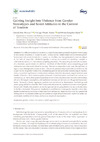Identificador persistente para citar o vincular este elemento:
https://accedacris.ulpgc.es/jspui/handle/10553/76062
| Título: | Gaining insight into violence from gender stereotypes and sexist attitudes in the context of tourism | Autores/as: | Díaz Meneses, Gonzalo Vilkaitė-Vaitonė, Neringa Estupiñán Ojeda, Miriam |
Clasificación UNESCO: | 531290 Economía sectorial: turismo 630909 Posición social de la mujer |
Palabras clave: | Belief Gender Harassment Segmentation Tourism |
Fecha de publicación: | 2020 | Publicación seriada: | Sustainability (Switzerland) | Resumen: | It is difficult to identify, but there is a type of harassment grounded in gender stereotyping in the context of tourism. It would be useful to discover the hidden relationships between gender harassment and certain beliefs about women as travellers, tourism professionals and sex objects in the field of hospitality. Methodologically, a survey was carried out reaching a sample of ±684 units by means of a convenience sampling procedure. The measuring instruments consisted of a structured questionnaire divided into two kinds of Likert beliefs scales comprising general statements and statements related to tourism. The survey respondent data were also gathered as regards sociodemographic characteristics. This paper presents empirical evidence to identify the causal factors of gender violence by considering general and particular stereotyping in tourism. Firstly, by performing three exploratory factor analyses, three female stereotyping dimensions were labelled in the field of tourism (occupational sexism, ambivalent sexist discrimination, and sex as a commodity), as well as three general prejudices about women (dysfunctional romantic relationships, ethically challenged presumptions, and aesthetical manners conventions) and the gender harassment factor. Secondly, a linear regression analysis was carried out to demonstrate that both general stereotyping related to a broader “life” framework and sectorial prejudices in tourism cause gender harassment. Finally, this research proves that general stereotyping determines sectorial prejudices in the field of tourism. The practical implications could be to enhance gender equality and combat gender harassment by revealing unintentional and unobserved prejudices that occur in a general life setting and in the tourism sphere against women as neglected professionals, under the subtle and ambivalent condition of travellers, and even as objects of consumption. | URI: | https://accedacris.ulpgc.es/handle/10553/76062 | DOI: | 10.3390/su12229405 | Fuente: | Sustainability (Switzerland)[EISSN 2071-1050],v. 12 (22), p. 1-13, (Noviembre 2020) |
| Colección: | Artículos |
Citas SCOPUSTM
5
actualizado el 08-jun-2025
Citas de WEB OF SCIENCETM
Citations
2
actualizado el 15-feb-2026
Visitas
126
actualizado el 11-ene-2026
Descargas
59
actualizado el 11-ene-2026
Google ScholarTM
Verifica
Altmetric
Comparte
Exporta metadatos
Los elementos en ULPGC accedaCRIS están protegidos por derechos de autor con todos los derechos reservados, a menos que se indique lo contrario.
